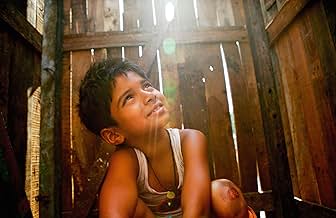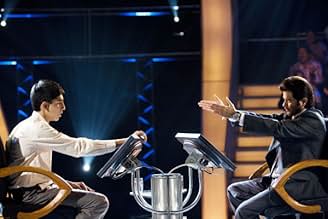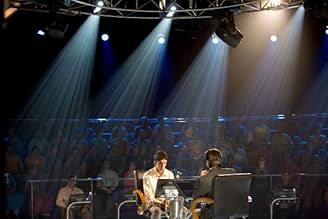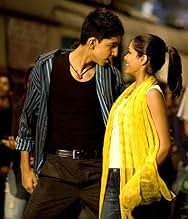Slumdog Millionaire
"Un adolescent à Mumbai songe à son édcuation dans les bidonvilles alors qu'il est accusé d'avoir triché à l'équivalent indien de ""Qui Veut Gagner Des Millions?""""Un adolescent à Mumbai songe à son édcuation dans les bidonvilles alors qu'il est accusé d'avoir triché à l'équivalent indien de ""Qui Veut Gagner Des Millions?""""Un adolescent à Mumbai songe à son édcuation dans les bidonvilles alors qu'il est accusé d'avoir triché à l'équivalent indien de ""Qui Veut Gagner Des Millions?"""
- Réalisation
- Scénario
- Casting principal
- Récompensé par 8 Oscars
- 153 victoires et 133 nominations au total
- Airport Security Guard
- (as Hira Banjara)
- Mr. Chi
- (as Sunil Aggarwal)
Avis à la une
The overall sweep of the film is very much a rag-to-riches story with love being the real heart of the film even if "money" (or a game-show for money) is the narrative driver and essentially it is modern day fairytale. In this regard it is an excellent film because you are engaged throughout, are totally on the side of the main characters and ultimately the viewer would give anything if they could only end the film happily. In this way it is uplifting and (ultimately) a really cheering film that is worth seeing with an audience because it is one of those things that unites an audience with a common feeling of cheer and goodwill. The method of delivery really helps the plot work because it is colourful, frantic and stylish.
I really enjoyed the fragmented time structure that uses the re-watching of the Millionaire questions in the police station as a trigger for flashbacks. This means we are gripped by several threads/times rather than it being a straight flow. It is not an amazingly unique device but the manner of it being put together prevents it ever being clumsy or obvious by how it transitions from one time to the other. Speaking of delivery and style, the film is understandably an Oscar contender generally thanks to its upbeat nature (after darker material last year and the current downturn in the world, Oscar probably will look for some feel-good stuff) but the areas I think it stands a great chance are those of cinematography, editing and direction. I say this because visually the film is a treat. It captures the colour of India with great camera work that puts us right in the scene. An example is the early chase through the slum, with a frantic camera, plenty of colour (in terms of palate, places and people) and a great visual style with the sun hitting the camera from above as it moves and other effective devices. With this much movement in the camera throughout the film, the editing is key in making these scenes work and it is excellent throughout even putting the subtitles in a stylish and arresting fashion which helped sell the use of Hindi but does also match the style of the film more than standard text would have. As director Boyle delivers on all this and his use of music is great as well. It does feel like we have the grit and style of City of God but yet also the warm uplifting story of the very best the "underdog" genre can provide.
That it achieves this is a testament to how well the film is delivered because it does have to overcome the fact that the majority of the film presents us with a terrible world of poverty and suffering and then gradually pulls the main characters out of it. This is a problem that the delivery covers but ultimately the viewer is left with some fairly harrowing realities that haven't gone away by the end of the film. I totally understand those who love the film unquestioningly but I do agree with those that take pause on this issue and note that it is an aspect of the film that really doesn't stand up in the cold light of day. You see, it is gritty and it is unpleasant and, although not based on a true story, this is a reality in our world and to see so much of it in a film that ultimately leaves you feeling good about life and happy that everything worked out alright is not a mix that sat particularly well with me. It isn't helped by the dance number over the end credits, which involved lots of people and pushed the "isn't everything great" idea more than the proper conclusion of the story did. I didn't like this part of the credits for this reason and also it would have been nice to see a film based in India that didn't feel it had to "do" Bollywood.
The cast mostly play to the "fairytale" side of the film more than the grit, although the young children are very impressive in the first sections of the story. Patel took a minute to grow on me but, although not the most charismatic of performers, he is really steady as the underdog who is driven. Kapoor is a great villain, driven by a hate that says a lot about the class system in place. Pinto is stunning and has a much stronger presence than Patel. Khan works the investigation scenes well, which was important as these are where the story is told from. There are no real weak links in the performances the fairy-tale nature of the tale means everyone has to focus on that side of it but they are still good.
The film is not as perfect as you will hear but it is still very good at what it does. It is a wonderfully stylish and slick romantic fairytale that is cheering and uplifting but of course this does give the slight problem that it is a stylish, slick and uplifting film that features horribly real images of cruelty and poverty. It doesn't manage to reconcile this but it is strong enough to make you ignore this for the vast majority of the time, leaving you tense, hopeful and weepy.
The acting all around was very good particularly from Dev Patel and the small kids. There performance are probably the only thing that is overlooked in this film. Without much of these very good performances the movie would not have been at the level it was at.The directing of Danny Boyle was his best yet. The look of the film was amazing and many screen shots of India were breathtaking. The musical score was very fitting to the style of the movie. It was one of the best scores of 2008. Where this film fell apart was at the writing. Towards the end its withdrew into a standard romance. It was no longer the great and amazing adventure we had witnessed for most of the movie. The complex relations seemed to be over simplified and it does the safe thing to do in the approach of tone but if taken into a drastically different direction could have lead it to be a real classic. Yet instead of ever peaking or sky rocketing to greatness it had plateaued and didn't deliver the way I had hoped it would, this largely in part by the failure of the screenplay.
Many people have compared this film to City of God because the film are actually similar in many ways. Yet City of God has something Slumdog Millionaire does not have which is depth and character motivations. These things are vital to these kind of movies being successful. City of God seemed to have a more plausible story because the story was more linear. Events took place as a result of other events. This did not happen in Slumdog Millionaire, the story was more chopped up and too many of the events just seemed to pop up out of no where. Slumdog Millionaire did take a very ambitious approach in the way it was made which is commendable. Is this a 1st rate movie though? The answer to that is no.
Verdict : To everyone who has still not seen the film, It's definitely a one time watch. Good music,Good story and Good (kind hearted if i may add) cast and crew. But i request you to watch it with an open mind. And by the way, Mumbai is not just a "slum area". :-)
The tale of two brothers' lives is told to us through episodic flashbacks tied to an episode of India's "Who Wants to be a millionaire?". At first, the story introduces one of the brothers as being the subject of a very strong interrogation to find out whether he is being truthful about some knowledge that might be relevant to the game. As he answers the questions, we discover that this young man's life story might be more interesting than we originally expected.
There is an element of freshness in the way the story is presented, as we accompany Jamal through his life odyssey from a young child in the slums to a man who is determined to save those he loves. There are some strong emotions in the film, and Boyle's direction keeps the film dynamic and engaging.
Prepare yourself to be overtaken by emotions as varied as joy, pity, happiness, anger, revulsion, surprise, and an exhilarating conclusion rarely seen in movies anymore. This film has made me grateful to be alive and that we still have people in cinema like Boyle who understands the power and beauty of the medium. He knows that the perfect mix of a great story and the respective imagery can provoke unforgettable memories in its audience.
During the premiere of the final cut (in the words of director Danny Boyle) at the Toronto International Film Festival, the audience gave the film an incredibly enthusiastic response, and it went on to win the People's Choice Award. Boyle, who is somewhat like a British Richard Linklater for yet again surprising the audience with such diverse subject matter, worked his magic. He transcended genres and created a truly unique and energetic picture.
Just about every aspect of this film deserves merit, and above all it belongs to Boyle, who managed to assemble such a massive achievement. The score by A. R. Rahman, with contributions from M. I. A., perfectly accompanies the action on screen. Still, it is great enough to be listened to on its own. With India as a backdrop, Boyle and his cinematographer have composed some remarkable images. The acting is roundly impressive, especially coming from the younger cast, almost all of which has never acted before.
The film begins as Jamal (Skins' Dev Patel) is under interrogation by Mumbai police for cheating on India's version of Who Wants To Be a Millionaire, being only one question away from winning it all. As the inspector says, even doctors and lawyers cannot come close to the 20m rupee prize, and so Jamal, having grown up on the streets of Mumbai, cannot possibly know these things. As Jamal tries to avoid further torture, he begins to explain to the police how he knew each of the answers. Flashbacks present Jamal's boyhood and explain how he got to the show.
At the centre of his journey is his brother, Salim, and a girl, Latika, who is left a homeless orphan after an attack that took Jamal's mother as well. After running from a man who exploits the trio for labour, Jamal replays the incident when Latika left his life when she was unable to catch a moving train. His uncertainty of her fate on the streets of Mumbai and his intense desire to see his first and only love again lead him to the interrogation room where the film began.
Like 'Juno,' Slumdog Millionaire is by genre a comedic drama, but it becomes much more. The film asks questions about fate, righteousness, greed, and even urban sprawl. Above all, however, it asks about love in the face of the most dire obstacles, and if it can truly prosper. Jamal's story is a tragic and unfortunate one, but as seen through his eyes, it is still beautiful. The vast colour palate of India overwhelm any negative feelings, and Jamal's hope of finding and being with Latika overwhelm despair. For Jamal, 20m rupees isn't his prize. It would be nearly impossible for there to be a better picture this year.
Danny Boyle's Movies Ranked by IMDb Rating
Danny Boyle's Movies Ranked by IMDb Rating
Le saviez-vous
- AnecdotesDirector Danny Boyle placed the money to be paid to the 3 lead child actors in a trust that is to be released to them upon their completion of grade school at 16 years of age. The production company has set up for an auto-rikshaw driver to take the kids to school every day until they are 16 years old.
- GaffesIn one scene, when teenage Salim and Jamal are at the Taj Mahal, there is an external shot where a passing guard looks at the camera and says, "Stop filming. Stop filming." This was included purposely by director Danny Boyle for the sake of realism.
- Citations
Police Inspector: [whispering] Doctors... Lawyers... never get past 60 thousand rupees. He's won 10 million.
[pause]
Police Inspector: What the hell can a slumdog possibly know?
Jamal Malik: [quietly] The answers.
[spits out blood]
Jamal Malik: [quietly and gently] I knew the answers.
- Crédits fousSeveral of the cast perform a traditional Bollywood song and dance number set in a train station over the end credits.
- ConnexionsEdited from Kaun Banega Crorepati? (2000)
- Bandes originalesO... Saya
Written and performed by A.R. Rahman and M.I.A.
Produced by A.R. Rahman
Published by K.M. Musiq Ltd./Imagen Music
Guitars by Sanjay Joseph
Additional Music Produced by P.A.Deepak
Recorded at A M Studios Chennai
Music Engineers : P.A.Deepak , Viviane & H. Sridhar
Song Mixed by P.A.Deepak
Mixed at Panchathan Rec Inn Chennai
Meilleurs choix
Détails
- Date de sortie
- Pays d’origine
- Site officiel
- Langues
- Aussi connu sous le nom de
- Quisiera ser millonario
- Lieux de tournage
- Sociétés de production
- Voir plus de crédits d'entreprise sur IMDbPro
Box-office
- Budget
- 15 000 000 $US (estimé)
- Montant brut aux États-Unis et au Canada
- 141 319 928 $US
- Week-end de sortie aux États-Unis et au Canada
- 360 018 $US
- 16 nov. 2008
- Montant brut mondial
- 378 411 362 $US
- Durée
- 2h(120 min)
- Couleur
- Mixage
- Rapport de forme
- 2.35 : 1
- 2.39 : 1
























